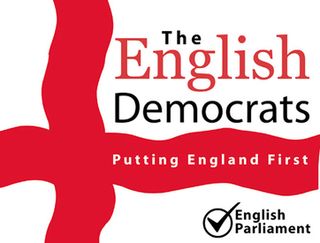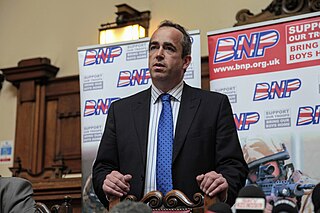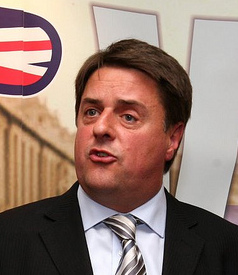The British National Party (BNP) is a far-right, British fascist political party in the United Kingdom. It is headquartered in Wigton, Cumbria, and is led by Adam Walker. A minor party, it has no elected representatives at any level of UK government. The party was founded in 1982, and reached its greatest level of success in the 2000s, when it had over fifty seats in local government, one seat on the London Assembly, and two Members of the European Parliament.

The English Democrats is a right-wing to far-right, English nationalist political party active in England. Being a minor party, it currently has no elected representatives at any level of UK government.
Derek William Beackon is a British far-right politician. He is currently a member of the British Democratic Party (BDP), and a former member of the British National Party (BNP) and National Front. In 1993, he became the BNP's first elected councillor, although he served for only eight months.
Martin Wingfield is a British far-right politician. Wingfield is long-standing figure in the British nationalist movement, he and his wife, Tina Wingfield, having contested several elections since the 1980s.
Andrew Henry William Brons is a British politician and former MEP. Long active in far-right politics in Britain, he was elected as a Member of the European Parliament (MEP) for Yorkshire and the Humber for the fascist British National Party (BNP) at the 2009 European Parliament election and held the seat until May 2014. He was the chairman of the National Front in the early 1980s. He resigned the BNP whip in October 2012 and became patron of the far-right British Democratic Party. He did not seek re-election in 2014.

The National Democrats (ND) was a British nationalist party in the United Kingdom (UK). The former party chairman, Ian Anderson, died on 2 February 2011, and the party was de-registered with the Electoral Commission on 10 March 2011.
Mark Adrian Collett is a British neo-Nazi political activist. He was formerly chairman of the Young BNP, the youth division of the British National Party (BNP), and was director of publicity for the party.
Far-right politics in the United Kingdom have existed since at least the 1930s, with the formation of Nazi, fascist and antisemitic movements. It went on to acquire more explicitly racial connotations, being dominated in the 1960s and 1970s by self-proclaimed white nationalist organisations that opposed non-white and Asian immigration. The idea stems from belief of white supremacy, the belief that white people are superior to all other races and should therefore dominate society. Examples of such groups in the UK are the National Front (NF), the British Movement (BM) and British National Party (BNP), or the British Union of Fascists (BUF). Since the 1980s, the term has mainly been used to describe those groups, such as the English Defence League, who express the wish to preserve what they perceive to be British culture, and those who campaign against the presence of non-indigenous ethnic minorities and what they perceive to be an excessive number of asylum seekers.
Edward Mark Butler is a former National Elections Officer of the British National Party (BNP) and was dubbed the party's "elections guru" by its newspaper, Voice of Freedom, until being suspended and expelled from the BNP in 2010 by Nick Griffin. He then became a member of the English Democrats before becoming associated with the For Britain Movement.
Richard Charles Edmonds was an English politician. He was the deputy chairman and national organiser of the British National Party (BNP) and also prominent in the National Front (NF) during two spells of membership.

Simon Darby is a British politician and former deputy chairman of the British National Party.
This article lists the British National Party's election results in the UK parliamentary, Scottish parliamentary and Welsh Assembly elections, as well as in the European Parliament elections and at a local level.

Nicholas John Griffin is a British politician who represented North West England as a Member of the European Parliament (MEP) from 2009 to 2014. He was chairman and then president of the far-right British National Party (BNP) from 1999 to 2014, when he was expelled from the party.
The British National Party (BNP) leadership election of 2011 was triggered on 28 June 2011 when the party adopted a new constitution that required a leadership election to take place every four years. Two candidates stood in the leadership election: Nick Griffin and Andrew Brons. On 25 July 2011, the results of the leadership election were announced, with Griffin being named the winner by just 9 votes. Griffin had secured 1,157 votes compared to the 1,148 votes for Brons.
The British National Party (BNP) is a far-right political party in the United Kingdom formed as a splinter group from the National Front by John Tyndall in 1982 and was led by Nick Griffin from September 1999 to July 2014. Its current chairman is Adam Walker. The BNP platform is centred on the advocacy of "firm but voluntary incentives for immigrants and their descendants to return home", as well as the repeal of anti-discrimination legislation. It restricted membership to "indigenous British" people until a 2010 legal challenge to its constitution.
Paul Martin Laurence Weston is a British far-right politician and blogger.
Adam Walker is the chairman of the British National Party. He was elected in a leadership election on 27 July 2015, having previously been appointed acting chairman by the National Executive when the then-leader, Nick Griffin, resigned.
The British National Party (BNP) leadership election of 2015 was triggered on 19 July 2014 when Nick Griffin stepped down as BNP leader to instead become the organisation's president, but was not announced until 29 June 2015. Two candidates stood in the leadership election: Adam Walker and Paul Hilliard. On 27 July 2015, the results of the leadership election were announced, with Walker being named the winner by a margin of 378 votes, which translated to a 55.35% margin of victory. Walker had secured 543 votes compared to the 145 votes for Hilliard and the 15 spoiled ballot papers.
The British National Party (BNP) leadership election of 1999 occurred on 28 September, and was intended to select a new leader for the BNP. It was triggered when Nick Griffin stood against John Tyndall for leadership of the party, after Tyndall had served for 17 years as leader of the party. Griffin won the election with 72.5% of the vote. The election returned a new leader of the BNP, and marked a shift in the party towards a more modern organisation, and with the intent of gaining broader appeal and legitimacy.




